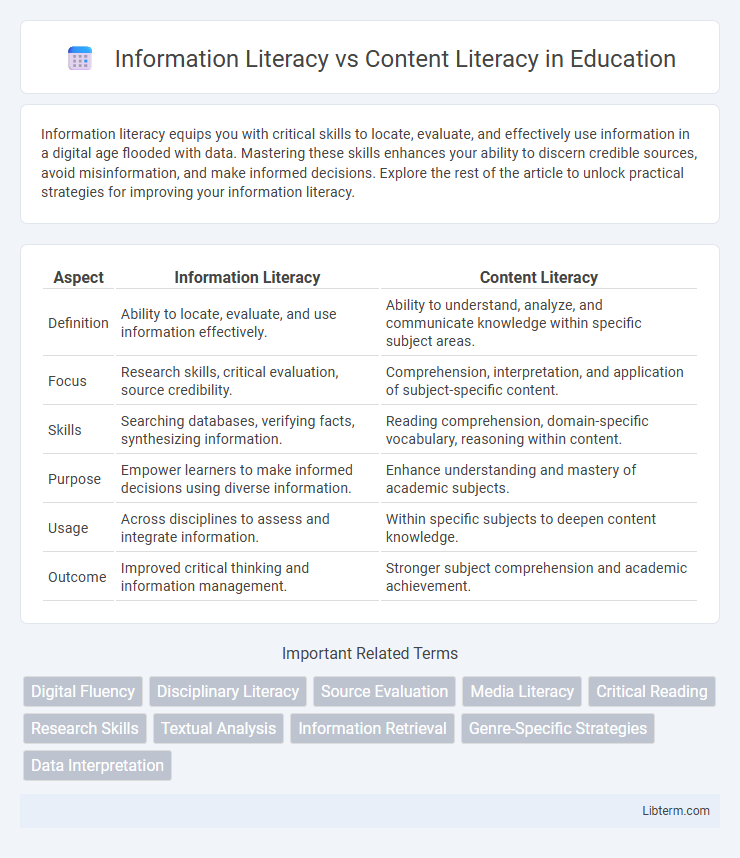Information literacy equips you with critical skills to locate, evaluate, and effectively use information in a digital age flooded with data. Mastering these skills enhances your ability to discern credible sources, avoid misinformation, and make informed decisions. Explore the rest of the article to unlock practical strategies for improving your information literacy.
Table of Comparison
| Aspect | Information Literacy | Content Literacy |
|---|---|---|
| Definition | Ability to locate, evaluate, and use information effectively. | Ability to understand, analyze, and communicate knowledge within specific subject areas. |
| Focus | Research skills, critical evaluation, source credibility. | Comprehension, interpretation, and application of subject-specific content. |
| Skills | Searching databases, verifying facts, synthesizing information. | Reading comprehension, domain-specific vocabulary, reasoning within content. |
| Purpose | Empower learners to make informed decisions using diverse information. | Enhance understanding and mastery of academic subjects. |
| Usage | Across disciplines to assess and integrate information. | Within specific subjects to deepen content knowledge. |
| Outcome | Improved critical thinking and information management. | Stronger subject comprehension and academic achievement. |
Introduction to Information Literacy and Content Literacy
Information literacy encompasses the skills required to locate, evaluate, and effectively use information from various sources, highlighting critical thinking and digital navigation. Content literacy focuses on understanding and interpreting specific subject matter through reading, writing, and communication within that discipline. Mastery of both literacies enhances academic success and lifelong learning by integrating information processing with subject-specific knowledge.
Defining Information Literacy
Information literacy refers to the ability to identify, locate, evaluate, and effectively use information to solve problems or make decisions, emphasizing critical thinking and digital literacy skills. It involves understanding information sources, recognizing bias, and discerning credible data from unreliable content. In contrast, content literacy focuses on comprehension and interpretation of subject-specific materials, such as texts within science, history, or literature disciplines.
Defining Content Literacy
Content literacy refers to the ability to comprehend, interpret, and analyze subject-specific information across various disciplines such as science, history, or mathematics. It involves mastering the vocabulary, concepts, and structures unique to each content area, enabling effective engagement with academic texts and materials. This specialized literacy supports deeper understanding and critical thinking within specific fields, differentiating it from broader information literacy skills.
Key Differences Between Information Literacy and Content Literacy
Information literacy involves the ability to locate, evaluate, and use information effectively across various sources and formats, emphasizing critical thinking and research skills. Content literacy focuses on understanding, interpreting, and analyzing specific subject matter or texts within academic disciplines to enhance comprehension and knowledge acquisition. The key difference lies in information literacy's broad application to diverse information contexts, while content literacy targets mastery and fluency in particular content areas.
Core Skills in Information Literacy
Core skills in Information Literacy encompass the ability to locate, evaluate, and effectively use information from various sources, emphasizing critical thinking and digital competency. Information Literacy demands proficiency in discerning credible sources, understanding information production, and ethical use, whereas Content Literacy focuses primarily on comprehension and interpretation within specific subject areas. Mastery of Information Literacy core skills enables individuals to navigate complex data environments and supports lifelong learning and informed decision-making.
Core Skills in Content Literacy
Core skills in content literacy include the ability to analyze, interpret, and evaluate information within specific subject areas, enabling deeper comprehension and effective communication. This involves critical thinking, synthesizing diverse content, and understanding discipline-specific vocabulary and concepts. Mastering these skills allows individuals to engage meaningfully with texts and media, enhancing knowledge acquisition and academic success.
Importance in Academic and Professional Contexts
Information literacy enables individuals to critically evaluate, locate, and use information effectively, which is essential in academic research and professional decision-making. Content literacy involves understanding and interpreting specific subject matter, crucial for mastering discipline-specific knowledge and skills. Mastery of both literacies enhances academic performance and career success by fostering critical thinking and specialized comprehension.
Teaching Strategies for Information Literacy and Content Literacy
Effective teaching strategies for information literacy emphasize critical thinking skills, source evaluation, and digital navigation to empower students in locating, assessing, and using information responsibly. Content literacy instruction integrates reading comprehension and subject-specific vocabulary with active engagement techniques such as discussion, summarization, and questioning to enhance understanding of discipline-specific texts. Combining inquiry-based learning with scaffolded guidance supports mastery in both literacies, fostering critical analysis and knowledge application across varied content areas.
Challenges in Developing Literacy Skills
Developing information literacy and content literacy skills presents challenges such as differentiating credible sources from misinformation and integrating critical thinking with subject-specific knowledge. Learners often struggle to navigate vast digital information while simultaneously applying domain-specific comprehension strategies. Educators must address gaps in technological proficiency and contextual understanding to enhance effective literacy skill acquisition.
Future Trends in Literacy Education
Future trends in literacy education emphasize the integration of information literacy and content literacy to prepare students for the digital age. Developing critical thinking skills alongside the ability to evaluate and synthesize digital content is essential for navigating vast online information ecosystems. Emerging technologies like AI-based adaptive learning platforms and interactive multimedia resources are transforming literacy instruction by personalizing learning experiences and enhancing content comprehension.
Information Literacy Infographic

 libterm.com
libterm.com